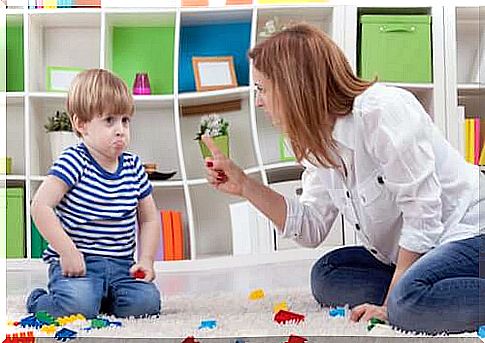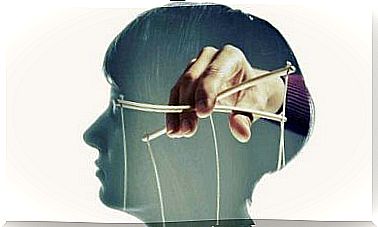Disobedient Children: 5 Keys To Action

Children present a lot of challenges to parents. From the moment of pregnancy, illusion and uncertainty mark the minds of parents. We cannot anticipate everything that is going to happen. There won’t necessarily be major problems. But when children are disobedient, family crises can cause tremendous damage.
Disobedience in children and their defiant attitude can intensify over the years if we do not take an appropriate approach to the situation. There is no magic formula that gets kids to play by the rules and behave in an ideal way.
However, from psychology , a series of guidelines can be applied to redirect the situation. Here we bring you some of the most important.

Disobedience in the little ones
Before proceeding with any intervention, it is necessary to identify whether the child is really disobedient. In childhood, it is common to go through certain stages and some of them are characterized by denial and challenge.
From around 15 months to 3 years old, children go through this stage. During this period, we can see how they position themselves almost systematically against our proposals.
However, it is part of their social development. They learn that their responses have an effect on their environment and thus begin to develop their independence and strengthen their character.
In view of this, it is best to adopt a patient attitude, understand children and anticipate situations by giving them more options to choose from. This way, they will feel more cooperative and the reactions will not be so negative.
Disobedience as such appears after 2 or 3 years, that is to say after this stage of denial if this stage has not been managed correctly. Disobedient children are those who continually ignore or refuse to play by the rules and also display some hostility towards their parents or other authority figures.
Some parents think that as the child grows, the disobedience will go away, but this is usually not the case. If these behaviors are not corrected, this child may develop into an adolescent with dyssocial behavior.
How to deal with disobedient children?
To treat disobedience in children, it is best to act as early as possible. Getting started at the earliest stage can make things a lot easier for years to come.
In this natural period, the most appropriate, according to specialists, is to maintain an attitude that maintains a balance between permissiveness and firmness. After this step, if the problem persists, it is recommended that you follow the instructions below.
1. Motivate the child
Disobedient children don’t like your attitude. The problem is, maybe they don’t know other ways to act or the benefits it can bring them.
Thus, it is necessary to find a way to motivate the little ones to behave appropriately. Let them understand that everyone will benefit and that they can express themselves in another way.
For years it has been proven and defended that the best educational style is one that balances discipline and affection. Thus, the problems arising from their behavior must be explained to them with affection, so that a plan of action can be agreed between the two parties. Children will thus learn to communicate in a healthy way.
2. In the face of disobedient children, act immediately without losing your temper
Although it is difficult, it is essential not to get impatient and not to get angry. It is much less viable to fight to see who can do the most. When faced with unacceptable behavior, the ideal is to step up to the child’s level and tell him, in a gentle but firm tone, that his reaction will not be tolerated.
It is important that the adult’s reaction or correction occurs immediately, not hours or days later. Once the moment has passed, it will be more difficult for the child to understand the extent of his behavior and the tension it can generate. Just as it will be more difficult to relate the rules or instructions to the specific situation.
3. Establish routines for disobedient children
A key aspect of avoiding disobedient and unexpected behavior is establishing a clear routine. Maintaining a stable schedule and consistency from day to day helps the child to anticipate what is to come. This makes it easier for him to understand the dynamics around him, which promotes collaboration and balance in everything he does.
In contrast, a disorganized routine will indicate that there is no structure, no limits and no rules. That nothing is expected of him and that he can do whatever he sees fit at any time. In short, a child may act disobedient or provocatively because he does not understand what responsibility is.
4. Set rules and limits
In this routine, it is essential that there are rules and limits. These must be clear, reasoned and adapted to age and resources. The child must be able to understand them. It is therefore important, when establishing the rules, that all members are present and that these rules are explained.
Messages should be clear. There is no point in telling the child “don’t do this” without explaining what behavior is desirable. If, for example, you want him to stop playing because it’s time to eat, it would be better to say, “It’s time to stop playing. Put down your toy and sit down to eat ”.
5. Avoid punishment and reinforce good behavior
For years, the usefulness of punishment has been proven to be questionable. In addition, punishment can lead to even more provocative attitudes. And therefore to undesirable behavior, because inappropriate behavior has an effect.
The results of reinforcing positive behaviors are much more powerful. When a child is behaving well, it is essential to point it out and explain why.
For this, it is not necessary to give him a gift or give him anything material. All it takes is a gesture of affection, thanking him and communicating your satisfaction. A hug or a few words will be enough to make the child want to repeat this situation.

Disobedience didn’t start out of nowhere
If there are disobedient children in the home, it should be remembered that this attitude does not come out of nowhere and it does not happen on a whim. Behind these behaviors there may be a child trying to communicate with you. He may need to know what is expected of him and how to act.
For this reason, it is essential that the whole family is involved and that the channels of communication remain open. If, despite these instructions, the problem persists, then it will probably be necessary to consider the possibility of consulting a professional to guide the process.










